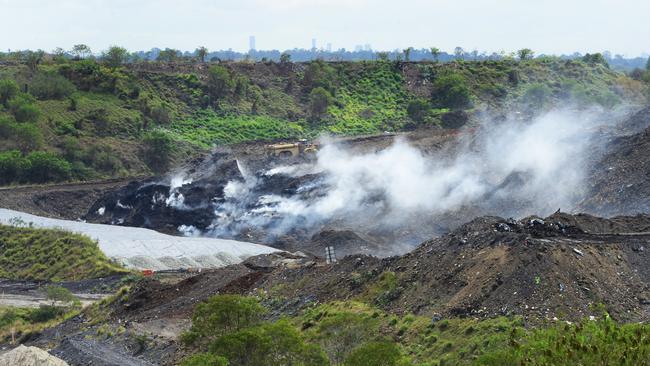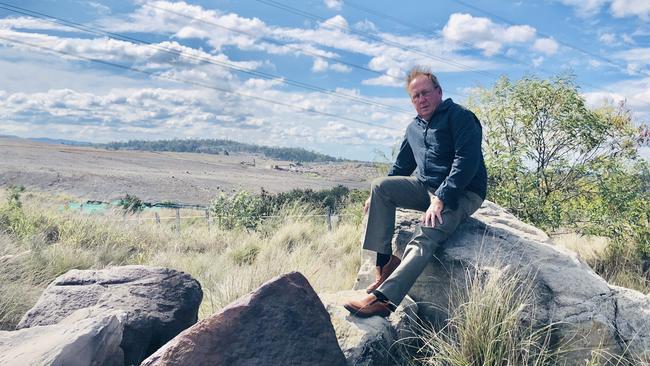Data reveals Ipswich residents have lower life expectancy than average, higher rates of lung cancer if they live near dumps
A staunch anti-dump campaigner says statistics for residents in Ipswich suburbs near waste facilities should be a huge red flag for the state government

Ipswich
Don't miss out on the headlines from Ipswich. Followed categories will be added to My News.
A STAUNCH anti-dump campaigner says alarming statistics related to the life expectancy and the rates of lung cancer for residents in Ipswich suburbs near waste facilities should be a huge red flag for the state government and needs to be investigated further.
Ipswich Residents Against Toxic Environments secretary Geoff Yarham said the waste industry has already had a “significant effect on people’s amenity and health”.
With a proposed incinerator for Swanbank looming, other waste facilities in the works and Ipswich City Council battling waste operators over the approval of new developments in court, Mr Yarham says anxiety within the community is only rising.

He pointed to data released by the Public Health Information Development Unit at the Torrens University in Adelaide, which examined the life expectancy of areas across Australia.
Professor John Glover from Torrens University said variations in the median age at death were impacted by many factors including “socio-economic disadvantages” influenced by unemployment, education, housing and income.
“Events like road traffic accidents among young people lower the median age, and the location of residential aged care facilities raise the median age,” he said.
“However, the strong influence of socio-economic disadvantage is clearly evident in the pattern of potential years of life lost across our capital cities.
“Regardless of variations between areas, I expect the data will place those areas with lower life spans under the spotlight, and hope that social and health policymakers, agencies and providers will be informed by these data, investigate the causes and further consider the needs of people in these areas.”
LOCAL NEWS: Motorsport stars to headline new Ipswich event
The research found while the average life expectancy for Ipswich Central and North Ipswich was 81, on par with the average for Australia and Brisbane and above Queensland, it was grimmer reading for some of the city’s eastern suburbs.
The average life expectancy for Redbank Plains and New Chum was 63, while it was 70 in Springfield and Redbank, 64 in Bellbird Park and Brookwater and just 57 at Springfield Lakes.
Mr Yarham said he was also alarmed by data from the Australian Cancer Atlas, which showed the rates of lung cancer in some Ipswich suburbs were much higher than the national average.
It was 47 per cent above the Australian average in Redbank Plains, while it was 20 per cent higher in Collingwood Park-Redbank, 19 per cent higher in Bellbird Park-Brookwater, 21 per cent higher in Goodna, 28 per cent higher in Springfield, 31 per cent higher in Ipswich, 39 per cent higher in Leichhardt-One Mile and 41 per cent higher in Brassall.
There is no data for New Chum.
“It could be reasonably concluded that the incidence of such a higher incidence of lung cancer in suburbs near waste facilities in Ipswich is an issue that the Queensland Government, particularly, the health department should be concerned about,” Mr Yarham said.
“I would suggest that there be an investigation into this matter.
“People in Ipswich are already talking about a class action about the effect to people’s health, amenity, lifestyle and property values.”
Mr Yarham said long standing issues were raised at a town hall meeting held in Bundamba in March 2018, which was attended by Premier Annastacia Palaszczuk, her Cabinet and local MPs.
READ MORE: Exciting plans for Tivoli Raceway after years of uncertainty
He believed that three years on little had changed, despite the state government spending $2.5 million on the Odour Abatement Taskforce.
“The state government had a Temporary Local Government Planning Instrument issued that was designed to try to manage the waste industry in the Swanbank/New Chum area,” he said.
“Unfortunately, this has not deterred waste companies from making applications for new or extended dumps covered by the TLPI.
“At the moment Ipswich City Council is defending two appeals for refusal and deemed refusal of two applications covered by the TLPI.
“This is an estimated cost of $4 million of ratepayers money.”
“Nothing has stopped. If anything, the intensity, duration and occurrence of putrid, obnoxious odours has increased.
“Many residents are starting approaches to class action lawyers due to these ongoing issues.
“These residents feel the state government issuing all these waste industries permits to operate whilst not overseeing these resulting in significant effect on people’s amenity and health are to blame.”
Read more stories by Lachlan McIvor here.
Originally published as Data reveals Ipswich residents have lower life expectancy than average, higher rates of lung cancer if they live near dumps


